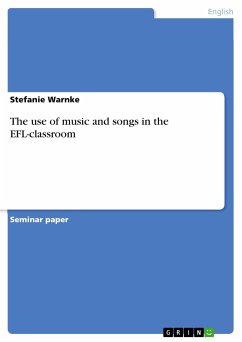Seminar paper from the year 2006 in the subject English Language and Literature Studies - Linguistics, grade: 1,3, http://www.uni-jena.de/ (Institut für Anglistik/Amerikanistik, Abteilung Fachdidaktik), course: Acting Out – Performance in the EFL-Classroom, language: English, abstract: I think that every teacher of a foreign language should provide various strategies of learning for the pupils. It is the teacher’s task to combine the different approaches of learning in order to make learning less complicated and more pleasant for the learn-ers. In my eyes, learning with songs and music, seems to be a successful method of learning English. Music plays an important role in the life of almost every person. We are surrounded by music all day long – while shopping in the super market, while eat-ing in a restaurant, even in the bathroom. Especially young people love music, but they do not only consider a song ‘cool’ when they like the artist, the melody or the sound of this piece of music. Nearly as important as that is the fact that the song conveys a particular message. In most cases, young people always identify them-selves with the content of the song, mainly when it touches a topic the pupil is very interested in or something the young person is about to go through (e.g. being love-sick or having problems with the social environment…). That means that young peo-ple have to concern with the lyrics of the song. This can be seen as a voluntary oc-cupation with language. And as long as this song is written in a language which is taught at school, every future teacher should catch this opportunity and make use of music and songs in the classroom. Music and songs provide quite a lot of material, which can be used for learners of English as a foreign language. There are quite a lot of positive sides of learning English via the medium music. First of all it is a very posi-tive way of learning English. Music is a part of our everyday life and especially young people are very familiar with music. If the teacher provides the possibility of a positive access to a new topic, the kids will learn the new things easier and with more fun and readiness. I am sure that the one or the other pupil turns out to be a little “music-expert”. This can strengthen the self-consciousness of students who are not so good at other areas because now they have the opportunity to show what they know about a special artist or band. Another pro of teaching language by using songs and music is that it is something different for the students – it is an alternation to the common methods of language learning, because it is not only interested in input. [...]

